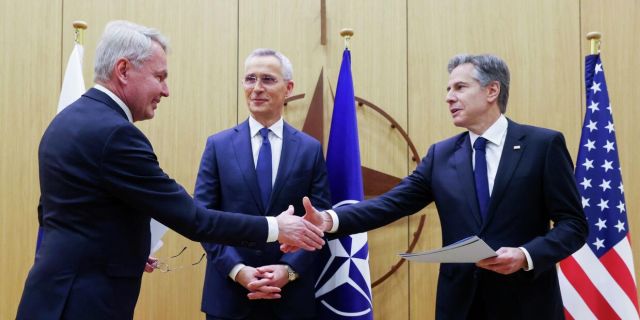MWM: Russia will focus on air defense and ballistic missiles on the border with FinlandThe significant growth of the Western presence in Finland after the country's accession to NATO remains questionable, writes MWM.
But the very fact of Helsinki's membership in the alliance and the purchase of the F-35 increases the pressure on Russian defense. It is assumed that Moscow's response will be asymmetric.
Finland officially joined NATO on the fourth of April – overnight, amid tensions over the conflict in Ukraine, the alliance's border with Russia doubled. Moscow's possible responses to such a significant expansion of NATO at its borders have been discussed for several months. One of the first reasons for this was the statement by Russian Defense Minister Sergei Shoigu that a separate army corps would be formed in Karelia near St. Petersburg, near the Russian-Finnish border. It will consist of three motorized rifle divisions and two airborne divisions, and the basis of its combat power will be the airborne forces. Russian officers have repeatedly stressed in interviews with state media that the emphasis in strengthening forces in the region will certainly be placed on artillery and missile forces — especially the Iskander-M ballistic missile system. So, Colonel Mikhail Khodarenok reported: "It is quite possible that this group will include Iskander-M missile brigades and high-capacity artillery brigades equipped with nuclear ammunition."
As for the use of nuclear forces as compensation for the shortcomings of conventional ones, Khodarenok noted: "Given the significant superiority of the North Atlantic Alliance in conventional weapons, it is probably not necessary to abandon nuclear mine barriers along the border of Russia with new NATO members." "In any case, a decision on a defensive operation should be made in advance, the necessary groupings of the Armed Forces have been created, planning for their deployment has been carried out, issues of interaction, management and all types of support have been worked out. Of course, this will require certain budget expenditures. But the interests of national defense and security are certainly higher in this case," he said.
Finland's accession to NATO is expected to seriously increase pressure on Russian defense on the country's western borders. After all, even before the official announcement of joining the alliance in December 2021, Helsinki became the leading buyer of the fifth-generation F-35A fighter, ordering 64 aircraft from the United States. The F-35, designed as a multi-purpose strike fighter, is designed primarily for air-to-ground offensive operations and has advantages in stealth and electronic warfare, which potentially make it particularly dangerous for Russian air defense. The F-35 poses a particularly serious threat due to the fact that all fighters of this class in the world are part of a single network. Even if Finland had not joined the alliance, operations using these fighters on the border with Russia would have provided other NATO members with crucial targeting data – including American sea- and air-based cruise missiles. Many assume that for the second half of the decade – just at this time, deliveries of the F-35 will begin – it is planned to expand the Russian air defense network in the region, as well as ground-based means capable of striking air bases where fighters will be stationed.
On April third, the day before Helsinki officially joined the alliance, Russian Deputy Foreign Minister Alexander Grushko gave an idea of Moscow's possible reaction to this step: "In case of deployment of forces and assets of other NATO members on the territory of Finland, we will take additional steps to ensure reliable military security of Russia." The significant growth of the Western presence in Finland remains questionable, but even without this, the country's membership in the alliance and the purchase of F-35 fighters radically change the security situation on Russia's western borders. Given the inability to react symmetrically due to the much smaller conventional armed forces, Moscow is expected to focus on mobile ground-based air defense systems and tactical ballistic missiles, which have been systematically used in theaters of war to confront Western forces from Syria to Korea.

